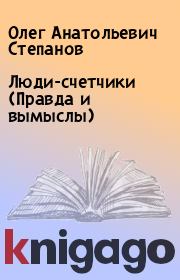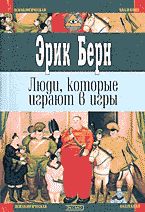Олег Анатольевич Степанов - Люди-счетчики (Правда и вымыслы)
 | Название: | Люди-счетчики (Правда и вымыслы) |
Автор: | Олег Анатольевич Степанов | |
Жанр: | Психология | |
Изадано в серии: | неизвестно | |
Издательство: | неизвестно | |
Год издания: | 2002 | |
ISBN: | неизвестно | |
Отзывы: | Комментировать | |
Рейтинг: | ||
Поделись книгой с друзьями! Помощь сайту: донат на оплату сервера | ||
Краткое содержание книги "Люди-счетчики (Правда и вымыслы)"
Эту книгу я написал по многочисленным просьбам трудящихся. Тема людей-счетчиков довольно закрыта и часто спекулируется малообразованными людьми. Думаю пора положить этому конец.
Читаем онлайн "Люди-счетчики (Правда и вымыслы)". [Страница - 3]
Thomas Fuller
African slave and mathematician 1710–1790
In most discussions of people with extraordinary powers of mental calculation, there is some mention of Thomas Fuller, an African, shipped to America in 1724 as a slave at the age of 14. He was born in 1710 Africa somewhere between present day Liberia and Benin. Late in his life his remarkable powers of calculation made him a tool of abolitionists due demonstrate blacks are not mentally inferior to whites. After is death, Fuller became a tool of psychics and psychologists. The latter, while denying blacks of mental abilities, supported the notion of idiot savant. Fuller, though extraordinarily quick at calculations, appears not so much the equal of idiot savants as someone who had taught himself quick calculations. Many of those who met him advertise his general self-taught intelligence and decried the system which prevented him from formal education.
Our present new understanding of mathematics in Africa at that time allows us to claim that when Thomas Fuller arrived in 1724 Virginia, he had already developed his calculation abilities. His learning of number words, a numeration system, of arithmetical operations, of riddles and mathematical games, etc. The extant evidence of this is not great, although we do know of an astronomer/mathematician, Muhammad ibn Muhammad, of that period from what is now called Nigeria.
Among the sparse evidence we have John Bardot's 1732 account of the abilities of the inhabitants of Fida (on the coast of Benin):
The Fidasians are so expert in keeping their accounts, that they easily reckon as exact, and as quick by memory, as we can do with pen and ink, though the sum amount to never so many thousands: which very much facilities the trade the Europeans have with them.
Thomas Clarkson backed this up in 1788 with:
It is astonishing with what facility the African brokers reckon up the exchange of European goods for slaves. One of these brokers has perhaps ten slaves to sell, and for each of these he demands ten different articles. He reduces them immediately by the head to bars, coppers, ounces… and immediately strikes the balance.
The European, on the other hand, takes his pen, and with great deliberation, and with all the advantage of the arithmetick and letters, begins to estimate also. He is so unfortunate often, as to make a mistake; but he no sooner errs, than he is detected by this man of inferiour capacity, whom he can neither deceive in the name or quality of his goods, nor in the balance of his account.
There are surviving today, two period accounts of Thomas Fuller (both are reprinted in 1, our chief source for information on Fuller). Below is another excerpted from the Columbian Centinial, December 29, 1970, No. 707, p.123, col.32, Boston, Massachusettes. Note the reference to an ancient mathematics puzzle known to the Egyptians. Also note its pro-abolitionist conclusion:
Died- Negro Tom, the famous African Calculator, aged 80 years. He was the property of Mrs. Elizabeth Cox of Alexandria. Tom was a very black man. He was brought to this country at the age of 14, and was sold as a slave…. This man was a prodigy. Though he could never read or write, he had perfectly acquired the art of enumeration…. He could multiply seven into itself, that product by seven, and the products, so produced, by seven, for seven times. He could give the number of months, days, weeks, hours, minutes, and seconds in any period of time that any person chose to mention, allowing in his calculation for all leap years that happened in the time; he would give the number of poles, yards, feet, inches, and barley-corns in any distance, say the diameter of the earth's orbit; and in every calculation he would produce the true answer in less time than ninety-nine men out of a hundred would produce with their pens. And, what was, perhaps, more extraordinary, though interrupted in the progress of his calculation, and engaged in discourse necessary for him to begin again, but he would… cast up plots of land. He took great notice of the lines of land which he had seen surveyed. He drew just conclusions from facts; surprisingly so, for his opportunities. Had his [Thomas Fuller] opportunity been equal to those of thousands of his fellow-men… even a NEWTON himself, need have ashamed to acknowledge him a Brother in Science.
4.2 THOMAS FULLER AND HIS AFRICAN MATHEMATICAL EDUCATION
Item 33 in 'Have you read?' contains brief information on the calculating prodigy Thomas Fuller (1710–1790), born in Africa and brought as a slave to the USA in 1724. John Fauvel (Open University, England) was so kind as to track the source of Rouse Ball's article (item 33): E.W.Scripture, Arithmetical prodigies, American Journal of Psychology, Vol.IV, 1891, pp.1-59. Scripture gives the following information (p.3):
"Thomas Fuller, known as the Virginia Calculator, was stolen from his native Africa at the age of fourteen and sold to a planter. When he was about seventy years old, 'two gentlemen, natives of Pennsylvania, viz., William Hartshorne and Samuel Coates, men of probity and respectable characters, having heard, in travelling through the neighborhood in which the slave lived, of his extraordinary powers in arithmetic, sent for him and had their curiosity sufficiently gratified by the answers which he gave to the following questions: First, Upon being asked how many seconds there were in a year and a half, he answered in about two minutes, 47,304,000. Second: On being asked how many seconds a man has lived who is 70 years, 17 days and 12 hours old, he answered in a minute and a half 2,210,500,800. One of the gentlemen who employed himself with his pen in making these calculations told him he was wrong, and the sum was not so great as he had said — upon which the old man hastily replied: stop, master, you forget the leap year. On adding the amount of the seconds of the leap years the amount of the whole in both their sums agreed exactly' [American Museum, Vol.V, 62, Phila., 1799].
Another question was asked and satisfactorily answered. Before two other gentlemen he gave the amount of nine figures multiplied by nine…In 1790 he died at the age of 80 years, having never learned to read or write, in spite of his extraordinary power of calculation." Fuller could find also the sum of geometrical progressions [F.D.Mitchell, Mathematical prodigies, American Journal of Psychology, Vol. XVIII, 1907, p.62]. It would be interesting to search for elements of the rich traditional African mathematical education Thomas Fuller had passed through before being sold as a slave to the USA (editors).
Who Was "The African Calculator?"
"The African Calculator" was Thomas Fuller (1710–1790), a Virginia slave who could neither read nor write, but who could quickly solve complex math problems in his head. He was once asked how many seconds a man had lived if he was 70 years, 17 days, and 12 hours old. It took Fuller only a minute and a half of mental arithmetic to answer: 2,210,500,800 seconds. One of his questioners laboriously worked out the calculation with pencil and paper, told Fuller he was wrong, and triumphantly gave another answer. In response, Fuller simply said, "You forgot the leap years."
Little is known of Fuller's life. He was stolen from his family in Africa at the age of 14, and sold into slavery. His owner was Mrs. --">Книги схожие с «Люди-счетчики (Правда и вымыслы)» по жанру, серии, автору или названию:
 |
| Елена Витальевна Камаровская - Как помочь школьнику? Развиваем память, усидчивость и внимание Жанр: Психология Год издания: 2010 |
 |
| Стивен Гайз - MINI-привычки — MAXI-результаты Жанр: Самосовершенствование Год издания: 2015 |




